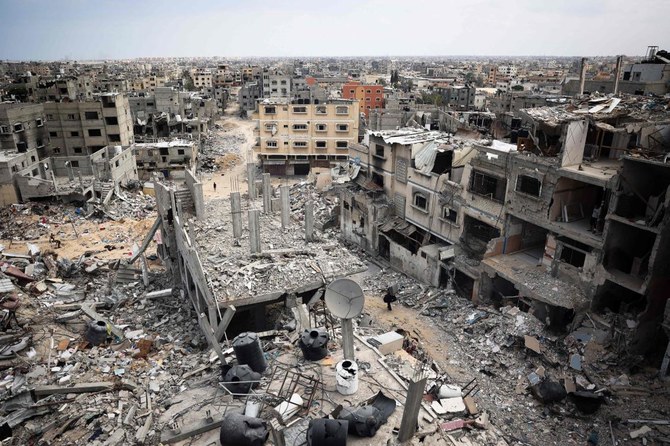
A UN expert estimates that rebuilding Gaza will take decades and cost close to $40 billion
A top UN development official told The National on Thursday that the reconstruction of Gaza would require around $40 billion, and he asked donors from the public and private sectors to contribute to postwar preparations.
The UN Development Program (UNDP) Regional Bureau for Arab States director and assistant secretary general, Abdullah Al Dardari, estimated that the early recovery phase for Gaza, which would take three to five years, would require approximately $2 billion in funding. The primary purposes of the fund are to clear debris, guarantee the operation of essential utilities, and begin the rehabilitation of a few homes.
“Some donors have to be aware that they will have to take a risk by investing a little bit of money,” he stated. “That’s why we said let’s have $2 billion [at first], a process that allows us to provide dignified livelihood for up to a million Palestinians, that will push the number to up to $3 billion, but still, it’s within reasonable means.”
He claimed that it will take decades to finish the long-term reconstruction plans and that the agency is having financial difficulties.
“We have a problem, but until we see a real, credible peace process, no one is willing to invest large sums of money in Gaza.” However, as Mr. Al Dardari noted, “We don’t know what that would take to see a serious and credible peace process.”
Since early October, Israel has been ruthlessly bombarding the Gaza Strip. Over 34,500 people have been murdered and some remain trapped under the rubble, with large portions of the enclave reduced to rubble.
Because there is a risk of explosives and missiles hidden behind fallen or damaged buildings, clearing and reconstructing damaged regions will take time and be perilous.
Teams from the UNDP are in Gaza right now evaluating the effects. According to Mr. Al Dardari, they discovered that 26 out of 30 municipalities have shut down.
Communities “no longer have any type of machinery, they cannot manage solid waste, they cannot provide any municipal services” in the civil services system.
According to UNDP estimates, almost 70% of Gaza’s homes have been destroyed thus far, but the organization issued a warning that as the conflict drags on, that percentage may rise to 80% or even 90%.
The top UN official cautioned that these projections could change in the event of an attack on Rafah, a city in southern Palestine where over 1.5 million people are seeking refuge.
We have been developing our plans and establishing a flexible planning framework based on the evaluations since, quite frankly, we have no idea what will transpire, how things will look, or who will be in charge of carrying them out. With whom will we collaborate? Will an assault or Rafah occur or not? Since the scenarios will alter at that point.”
According to Mr. Al Dardari, the Israeli campaign in Gaza has left behind 37 million tons of debris, much of it packed with unexploded bombs that could take over ten years to clean.
“After 51 days of fighting in the 2014 conflict, we had 2.4 million tonnes of debris. We currently have 37 million tonnes, and that figure is rising daily.”
The international community is unsure of when to start offering the services to civilians because they are unsure of how the peace process will turn out, he continued.
We are engaged in extremely complex planning, referred to as just-in-time planning. Regarding the first day following the end of the war, he stated, “We would have to start working on the removal of the debris immediately on day one.”
According to Mr. Al Dardari, work will begin in Gaza’s north to enable the displaced to go back to their homes.
“The most dangerous times in any post-conflict situation is when there is a ceasefire and we are not ready to step in with some sort of livelihoods, rebuilding and economic recovery,” he stated.
The organization asked for help from the commercial sector so that the healing process could proceed more quickly.
“Is it better to wait? Then, it’s already too late? Or should we invest some money now, taking a chance that it may be profitable? We will come in swiftly if there is a ceasefire; that is the conundrum that everyone is facing.”
From the beginning of the conflict, Mr. Al Dardari stated that his team has been preparing for the day after the war ends, and Gaza “cannot afford” to wait six or eight more months to begin the implementation process. “So please, help us do that,” he urged.
All Categories
Recent Posts
Tags
+13162306000
zoneyetu@yahoo.com


